Positive Change: A Collective Vision for the Future
Editor’s note: More than 30 years ago, pipes|drums was the first publication to consider the role of women in piping and drumming, the strides forward that have occurred, and the many challenges that remain in our historically male-dominated competitive arts.
With approximately one-third of all pipers and drummers being female, regularly checking in on the status of females, as well as other minority groups, is a core value of the publication.
By Eilidh MacDonald
One of my favourite pipe band conversation topics to discuss is “what is the best pipe band medley ever?” I have an immediate answer for this: my personal all-time favourite is SFU 2004. I love the “Air in B Minor” and its reprise – the harmonies are tasty.
Beyond it being objectively very good, I think part of my love for this air is the fact that it was co-composed by Dani Brin Millar. Dani is a piper in SFU and has been for many years. After growing up in Saskatchewan, Canada (which is also where I grew up), she moved to British Columbia to study and play in SFU, winning the Worlds with the band six times since. I remember watching SFU band practices as a kid and then as a teenager, observing every detail about how she held her pipes, stood, and how her hands looked on the chanter. Dani wore white low-top Converse sneakers to band practice, so I, too, got a pair of white low-top Converse sneakers to wear. I have always looked up to her and found her inspiring. Growing up a decade behind Dani, she demonstrated to me what is possible for a young female piper from Saskatchewan. It gave me hope and fuelled my ambition.
Every March 8th, International Women’s Day rolls around, and I generally find it frustrating and exhausting. I considered the options when asked to put something together to mark the occasion in the piping and drumming world. The first would be to simply celebrate women and their accomplishments, but this felt like it is ignoring the issues. Alternatively, I could describe the massive disparity and discrimination that occurs for women in pipe bands, drumming, and piping. This approach is depressing and likely an ineffective strategy for positive change.
And in my mind, that is the goal: positive change. So, eventually, I realized that perhaps the best approach might be to instead consider what lies ahead. I wanted to hear from women in the piping, drumming, and pipe band scene to understand what they envision the future to look like, so in the past three days, I reached out to nearly 100 women and girls that I know from across the world that are involved, and I posed the following question:
If you imagine that it is 2044 and you think about women in pipe bands/piping/drumming: what does that ideal future look like, in particular at the highest level? What makes you hopeful? What do you wish for?
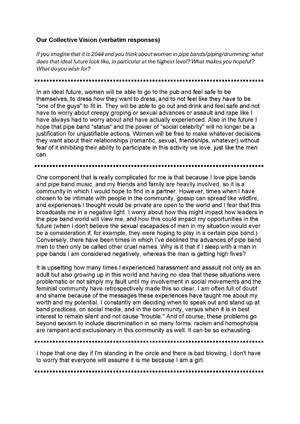
I received ~10,000 words in responses from upward of 60 women, and here is a summary of what I learned:
They believe that by 2044, there will be more female dominance in the pipe band world:
- Nearly everyone wrote that they hope for an equal distribution of women in pipe bands with at least a 50-50 split between men and women in all sections.
- They hope for more female pipe-majors, leading-drummers, instructors, judges, committee members, and women in the front rank. They hope that people aren’t surprised to see them there.
- They have hopes of a top all-female pipe band, and for bands with female pipe majors and leading drummers to win the Worlds.
- They hope to see women regularly competing in and winning the big solo competitions.
- They talk about a future with more inclusive uniforms that fit all bodies to encourage self-belief and confidence.
- They describe an increase in respect for the bass section. The tenor drum is the only instrument that generally has more women than men, and it is also currently the only instrument that the RSPBA does not require for a pipe band to compete.
When describing what we wish for in the future, it is natural to use our current experience as a frame of reference. As such, there are also some hopes for the future that are heart-breaking descriptions of the present.
- They wonder how many women could’ve played at the highest level but couldn’t deal with the misogyny. So they hope that by 2044 the culture of piping organizations will shift to foster feelings of safety, belonging, and uncapped potential for women who belong to them.
- They describe feeling hopeful that men will support and believe women when they disclose harassment, assault, or abuse in our community.
- They hope that men and boys will call out bad behaviour from other men and boys (in public and in private).
- They talk about being able to socialize and feel safe without having to worry about creepy groping, sexual advances, or assaults.
- They hope for a future in which pipe band “status” and the power of “social celebrity” will no longer be justifications for unjustifiable actions.
- They hope that in 2044, women won’t have to worry about being kicked out of pipe bands because they are women.
- They describe a future in which we will be able to choose to play in pipe bands without feeling that doing so lowers our tolerance or compromises our standards for how we want to be treated and respected.
- They hope that everyone will realize that “excellent pipers who behave badly are like good expression spoiled by crossing noises – pretty disappointing and really quite offensive.”
- They hope that “one day if I’m standing in the circle and there is bad blowing, I don’t have to worry that everyone will assume it is me because I am a girl.”
- They hope that in the future, we won’t hear “she’s the best woman piper I’ve ever heard” or “she’s really good for a girl,” as those specifications will not exist.
- They hope they won’t need to guess if compliments from men on their playing are genuine or if they are said to objectify or entice them.
- They hope that we look back only to say, “remember when . . .” and shake our heads in disbelief over what we used to put up with.
One person said, “as a young woman surrounded by mostly males in the piping world, it is hard not to let it get you down. That’s why I find it so important to surround myself with so many amazing women in the pipe band community. I feel so much excitement and so much hope when I see another woman piper or a young girl with so much future ahead of her. I just want to wrap her up and make sure no one crushes her dreams.”
“One day if I’m standing in the circle and there is bad blowing, I don’t have to worry that everyone will assume it is me because I am a girl.”
One of my other favourite things about that SFU 2004 medley is that it was, to my knowledge, the first time a medley had a slow air reprise. This was innovative, exciting, and new. Lots has changed since 2004. Twenty years is a long time. Now, a slow air reprise is a common and effective tool in pipe band medley construction. This gives me hope. Twenty years from now, in 2044, I hope we will see not only creative musical advances but also advancements that result in equity and safety for women in our community. I think it starts with believing women when they say things are not acceptable the way they are. Most of the women wanted to remain anonymous, indicating that people still don’t feel safe describing their experiences. To change, we need to be willing to acknowledge and identify our subconscious biases about women in pipe bands and challenge ourselves on them. We have created a vision for where we want to go: next we need to determine the steps to be taken to get there.
Not only is equity important for the sake of women – it benefits everyone. Dani’s musical talent and harmony writing prowess helped make that 2004 medley what it was – it would not have been the same without her. As one of the young women I spoke to said, “Women should be recognized for their hard work and talent, rather than just for equity’s sake.” Perhaps in 2044, girls and women who grew up playing together will be back competing in pipe bands again, and we’ll be looking over at our 18-year-old daughters across the circle during the slow air reprise in the Grade 1 arena.
Thank you to all of the women who took the time to contribute their thoughts and ideas. You give me hope:
- Jamie Alfred, tenor drummer, Canada
- Suzanne Birney, tenor drummer, Scotland
- Katie Buckland, piper, Canada
- Bree Caldwell, snare drummer, Canada
- Michelle Carline, piper, Canada
- Louise Cassidy, tenor drummer, Scotland
- Brìghde Chaimbeul, piper, Scotland
- Hollie Chalmers, snare drummer, Scotland
- Iona Fawcett, tenor drummer, Scotland
- Hannah Focken, piper, Canada
- Jenah Healy, snare drummer, Canada
- Margaret Houlihan, piper, Ireland
- Eireann Iannetta-Mackay, piper, Scotland
- Tori Killoran, piper, Canada
- Marianne Kirby, snare drummer, Australia
- Barbara MacDonald, piper, Canada
- Bhreagh MacDonald, bass drummer, Canada
- Ryan MacDonald, piper, Canada
- Kylie MacHattie, piper, Canada
- Heather MacIsaac, piper, Canada
- Karen MacLean, piper, Canada
- Jill MacNeil, tenor drummer, Canada
- Karen McCrindle Warren, piper, Scotland
- Emma McDougall, tenor drummer, Scotland
- Eala Mcelhinney, piper, Scotland
- Robyn McKay, piper, Scotland
- Sharleen Muir, tenor drummer, Scotland
- Erin Nicolson, tenor drummer, Canada
- Brittney Otto, piper, Canada
- Jessica Reid, tenor and bass drummer, Canada
- Avens Ridgeway, piper, USA
- Heather Stone, piper, Canada
- Elizabeth Shaw, snare drummer, Canada
- Liz Sheridan, piper, Canada
- Cicely Sparks, piper, Canada
- Sarah Staub, tenor drummer, Canada
- Molly Steuber, snare drummer, Canada
- Lauren Thompson, tenor drummer, Scotland
- Jessica Theriault, piper, Canada
- Elizabeth Shaw, snare drummer, Canada
- Elaine Stone, piper, Ireland
- Sky Wishart, tenor drummer, Scotland
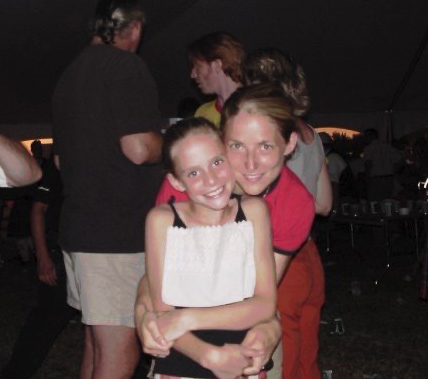
Eilidh MacDonald grew up piping in Saskatchewan, Canada, with instruction from both her parents. She spent a decade as a member of the 78th Highlanders (Halifax Citadel) with tuition from Bruce and Alex Gandy in Halifax, Canada. She moved to Glasgow in 2021, competed with ScottishPower in 2022, and now is delighted to be with Shotts & Dykehead Caledonia. Eilidh has a PhD in Cardiovascular Physiology and Biophysics and is a Postdoctoral Research Fellow at the University of Glasgow.
What do you think? We welcome your thoughts, so please use our Comments feature below to submit them.

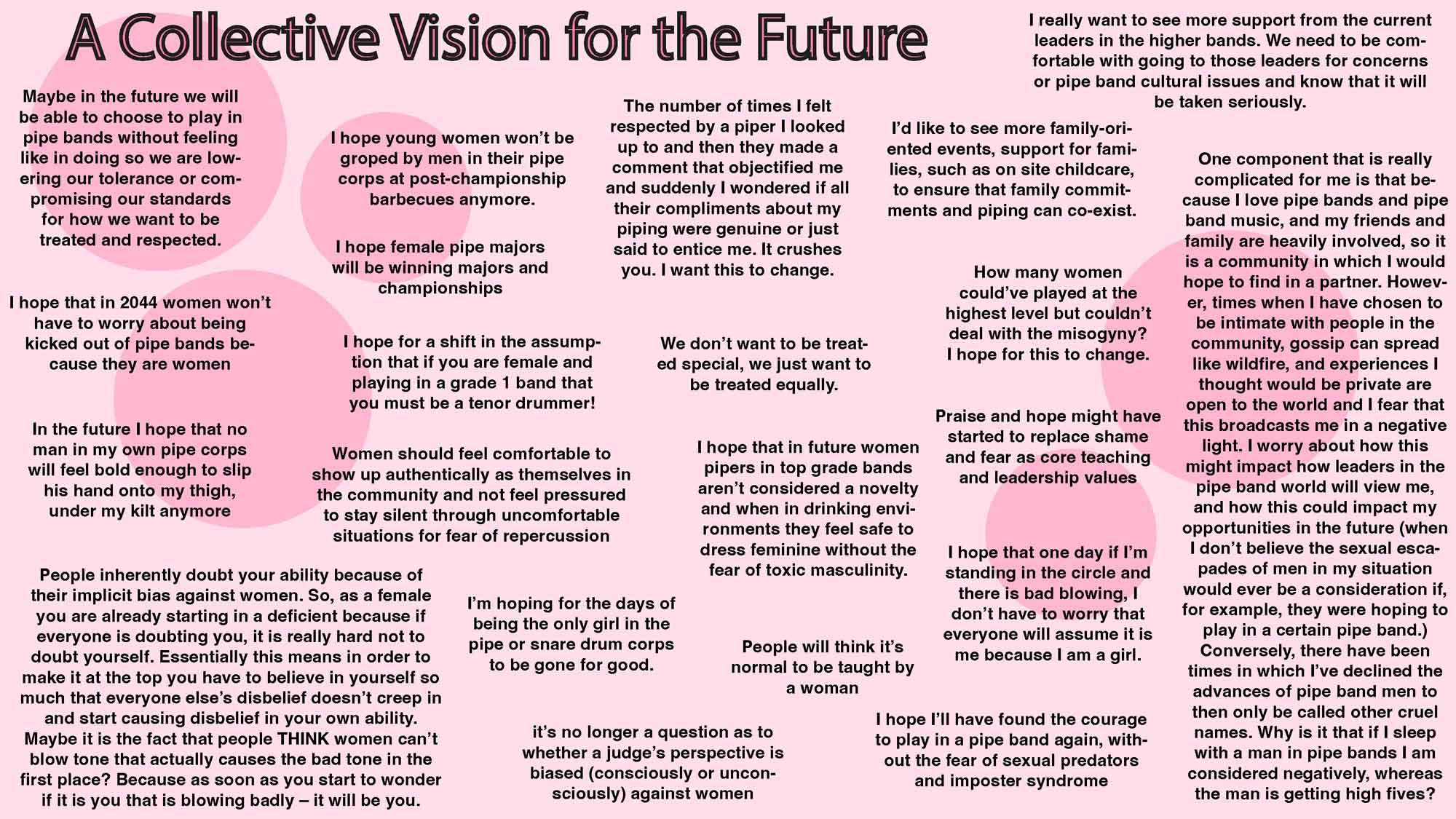

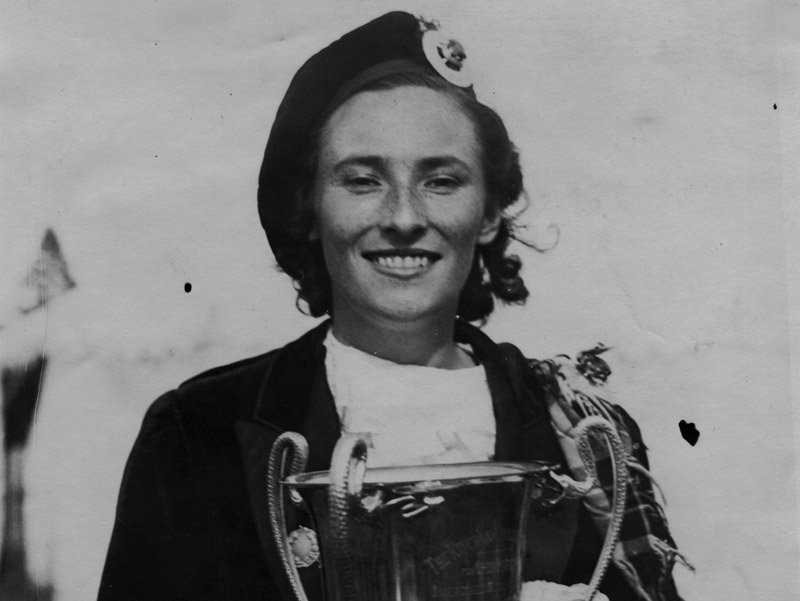
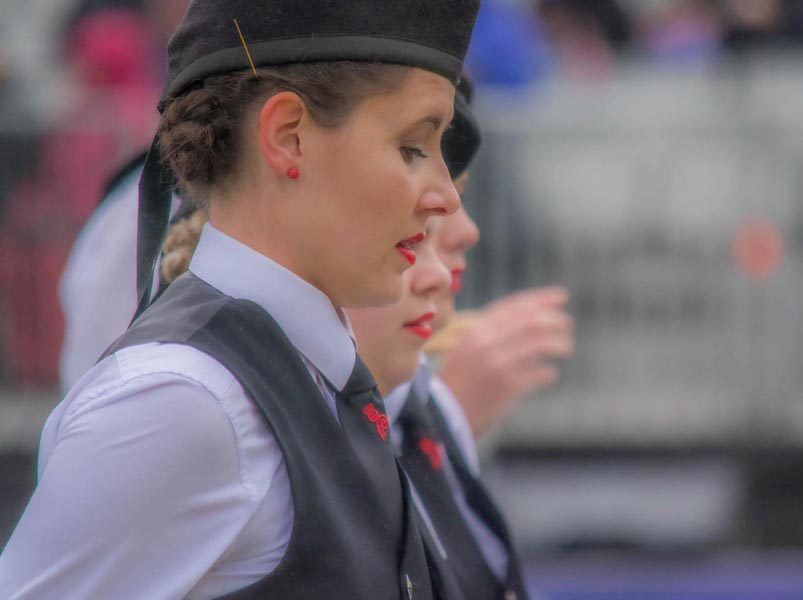
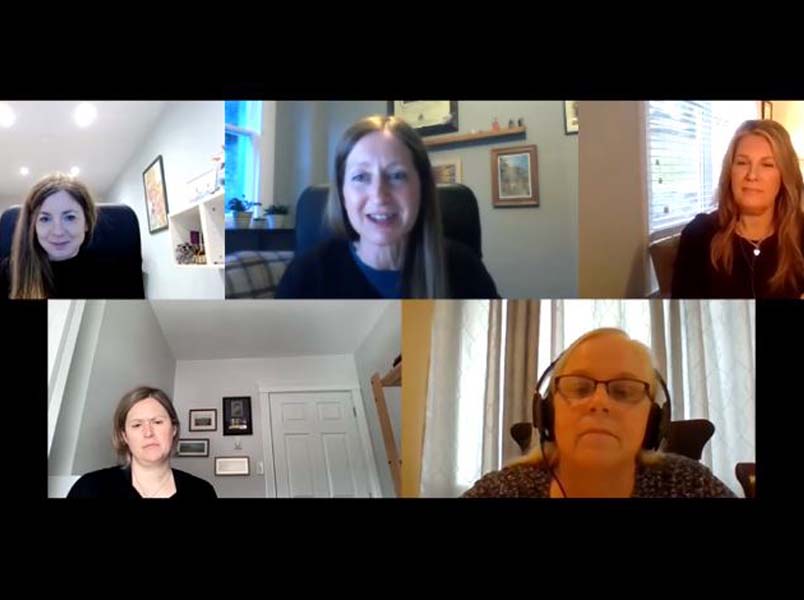
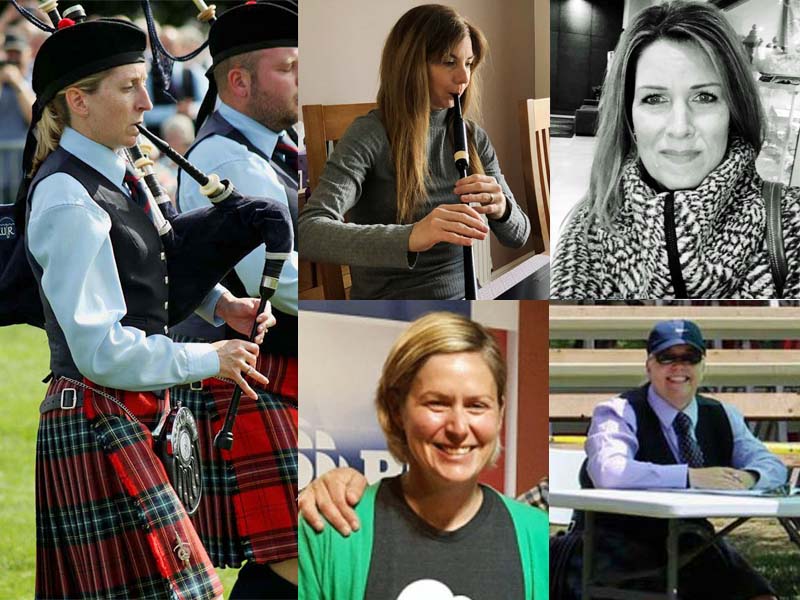

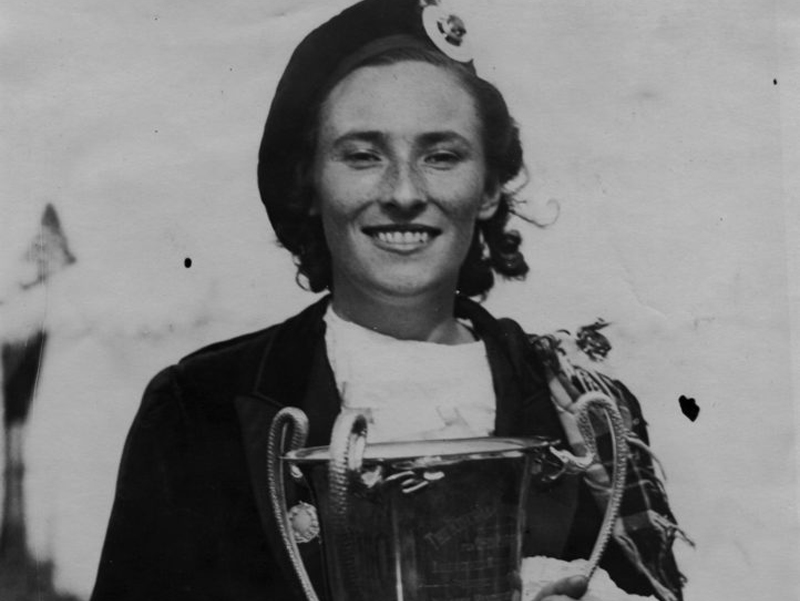
I took my nine-year-old daughter to her first band practice/chanter lesson two weeks ago and although she was enthusiastic and excited afterward, the first question she asked me was: “Why aren’t there more girls in my class?” She was the only one.
She essentially indicated – after just one experience – that she would enjoy herself more if she saw herself better represented. It broke my heart, both as a piper and a parent, that the joy I experienced and wanted to share could be tempered for my daughter through no fault of her own.
I knew my answer to her question would need to be a good one, but I really struggled with it; throughout most of my piping career, the same disparity had existed without much (or any) concerted community effort to change things for the better. I explained to her that it had nothing to do with anyone’s ability or desire. It had everything to do with historical prejudices and…well…sexism.
The best advice I could offer was, that by her mere presence, she was actively helping to change impressions and stereotypes that so obviously discourage people (especially those who don’t look like her dad) from both trying and succeeding in piping. That’s quite a burden for a nine-year-old to carry, but she’s tenacious (like her mother) so I know she’s up to the challenge and responsibility that comes with it.
Thank you to people like Eilidh, Dani, Bonnie Bevan, Megan Harrington, Ryan MacDonald, and Kylie MacHattie for being amazing, awe-inspiring pipers and even greater role models for my daughter.